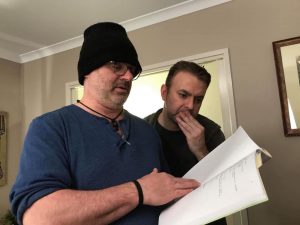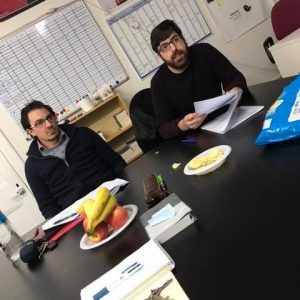The S Blog: Stuart, Steve, and Seth
Slow-to-almost-no progress this week, as our director of photographer, Stuart Jaymes, has developed pneumonia. We did film one brief scene for a montage, as that had required us (well, Maria) to notify and arrange permission for us to film a Taekwondo class. But for that scene, our sound guy, Bil Chute (who’s also a director of photography) took over.

All our other scenes (and it was going to be a busy weekend) were postponed.
That gave me some time to finish writing the new opening for my new novel, which had tentatively been functioning under the acronym of TFSoLY. As I wrote the novel, I thought that acronym (which I won’t unpack) gave away too much of the story. Now it’s been tentatively renamed Thank You for Loving Me (although I do have a longlist of alternatives).
I’m going to do a couple of more reads and then send it out to my alpha readers, and, possibly, my publisher – well, as long as I feel happy with where it’s sitting. If they like it, they’ll provide their own structural feedback. Right now, I like it. That doesn’t mean anything, though, and hardly helps the book’s viability. An author is the worst judge of their own work. But I think I accomplished what I set out to do, so that’s something.
I’ve also begun advertising that I am available for manuscript assessments and editing glimpses. I haven’t returned to full-time editing, which is time- and energy-intensive. I can fit in assessments – and I’d like to think my assessments are so detailed and informative that they’re as good as an edit. An editing glimpse is an edit of just 2,500 words, which can give authors an idea at things they can look out for in the rest of their manuscript. But check out my page for my details.
Back to Little Diva Rising: I’m introducing the crew as I met them, and the cast a little more haphazardly. I’ve already talked about knowing Tony when we were kids, and how he later introduced me to Maria. They both then introduced me to Stuart.
Stuart is a talented photographer and director of photographry. He’s has a brilliant understanding of what does and doesn’t work visually. When we first met to discuss the action feature I’d written, But the Truth, he’d already storyboarded some of the scenes so I could understand how he was seeing it.
He’s also gorged on a wide range of filmmakers, which I can appreciate. As a novelist, you need to read to see what other people are doing, to understand different styles, and to learn about writing (even if you’re only learning through osmosis). Filmmaking’s no different. You need eclectic tastes to develop your own voice.
So far Stuart’s been invaluable in suggesting ways of shooting Little Diva Rising – not just from a physical point of view, but also in terms of presentation. There are lots of things that you can do in how you frame, block, and light scenes that inform the audience beyond what they’re seeing and hearing from the actors, their actions, and the locations.
When we’ve talked about my various screenplays, he’s always been able to understand exactly what I’ve tried to accomplish. If he’s unsure about anything, his questions are incisive. If he identifies something that’s not working, or not quite coming across, he challenges me in a way that gives me an insight into how I can address the issue. Stuart (and Bil) also come across as relaxed and laid back. I don’t know how the inside of their heads work; mine’s always firing away manically, but they are so placid and always-in-control that it permeates the set.

Two of the actors I worked with on the first weekend are Steve Sammut and Seth Kannof. I’m going to refrain from telling you that [FILL IN THEIR NAME] is the nicest person. Everybody has been. It’s been such a wonderful experience – a mix of conviviality and creativity. So I’ll refrain from repeating myself weekly and make you a deal: you can accept that everybody I blog about is the nicest, and I’ll let you know if somebody isn’t.
Steve brims with this quirky intensity that always makes me think of Steve Buscemi. Our Steve plays producer Jason Lansing, who’s a product of a bygone generation, and oblivious to the world around him. He’s interested only in ratings of this show that he’s producing.
Maria hand-picked Steve – it was one of her inspired selections. Steve’s always open to suggestions, as well as trying new things, but from the beginning he brought an immediate energy to the role, contained within this air of condescension, coated in this ingratiating charm – you’ll love him while you’re loathing him. Steve’s improvisational flourishes (which I’m not going to mention because of … SPOILERS) are brilliant. Just the way he’s portrayed Lansing has generated new ideas about what else I can do with Lansing outside of what I’ve already projected.
For the character of Paul Grady, we auditioned a number of actors. Each offered something unique, and had us discussing who was the best fit. We all had preconceptions of the way Grady would look and play, and each captured a different facet. Then Seth came in. An American expat (he married an Australian, and came to live here) he was immediately Grady, capturing his suppressed desperation, the nuances of his underlying hopelessness, and the veneer of professionalism he struggles to wear over it all. Seth had obviously thought a lot about Grady and why he is the way he is. When we gave him the character’s bio, he said he had to adjust the way he thought about Grady as he integrated all this new information.
Grady was intended to be Australian, but Seth so won us over that I revised Grady’s bio to accommodate Seth’s background. Seth has something of a young Al Pacino about him (a la Serpico, or And Justice For All): he’s quietly spoken but intense. A lot of thought goes into every word he delivers, and every action he executes.
He and Steve play amazingly off one another. Their characters are driven, ambitious creators, but coming at it from polar extremes – Lansing the commercial entrepreneur who doesn’t care about art, Grady the considered artist who wants to make something meaningful.
It’s a fiery clash that I’m sure is going to provide lots of entertainment.
